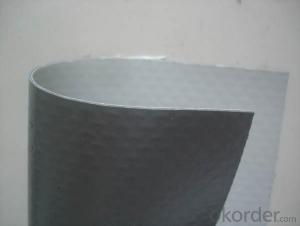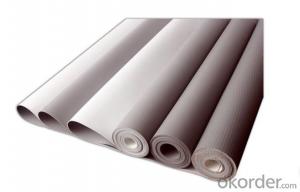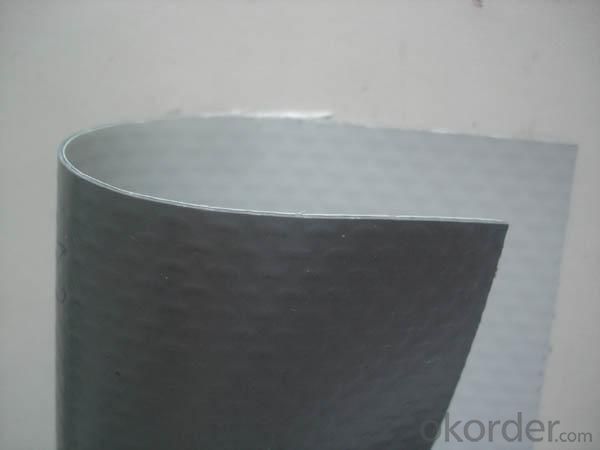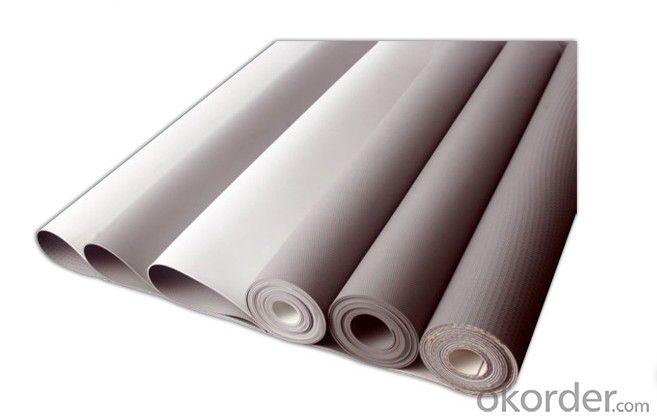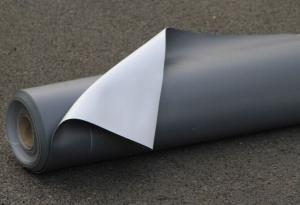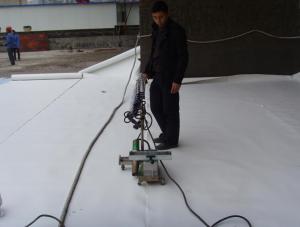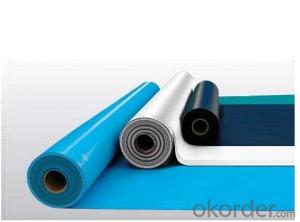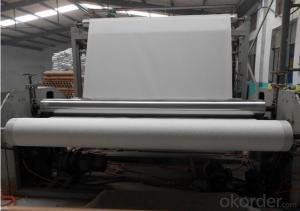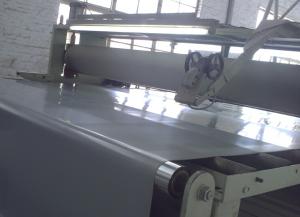PVC Roofing Garden Waterproofing Membrane
- Loading Port:
- China main port
- Payment Terms:
- TT OR LC
- Min Order Qty:
- 5000 m²
- Supply Capability:
- 100000 m²/month
OKorder Service Pledge
OKorder Financial Service
You Might Also Like
1.Specification of PVC Membrane
Item | PVC waterproof membrane |
Thickness | 1.0-2.0mm |
Width | 1-2m |
Length | as customer’s request |
Color | White, Green, Black, Grey,other |
Material | PVC |
Surface | smooth/textured surface/PET nonwoven fabric |
2.Technical data of PVC Membrane
No. | Item | Index | ||||||
H | L | P | G | GL | ||||
1 | resin thickness over the fabric mm,≥ | — | 0.4 | |||||
2 | tensile strength | max tension (N/CM),≥ | — | 120 | 250 | 120 | ||
tensile strength/Mpa,≥ | 10 | — | — | 10 | — | |||
elongation at max tension/%,≥ | — | — | 15 | — | — | |||
break elongation/%,≥ | 200 | 150 | — | 200 | 100 | |||
3 | thermal size change/%,≤ | 2 | 1 | 0.5 | 0.1 | 0.1 | ||
4 | low temperature flexibility/℃ | —25 no crack | ||||||
5 | impermeability | 0.3MPa,2h impermeable | ||||||
6 | anti-impact | 0.5kg.impermeable | ||||||
7 | static load | 20kg impermeable | ||||||
8 | cut strength/(N/mm),≥ | |||||||
joint peeling strength/(N/mm),≥ | 4 | 3 | ||||||
9 | vertical tearing strength/(N/mm),≥ | 50 | — | — | 50 | — | ||
10 | trapezoid tearing strength/(N/mm),≥ | 150 | 250 | 220 | ||||
11 | water absorption(70℃,160h)% | after saturation≤ | 4 | |||||
after dry≤ | —0.4 | |||||||
12 | heating aging | hour/h | 672 | |||||
appearance | no bubble,crack,seperation | |||||||
tensile strength retention/% | ≥85 | |||||||
elongation retention/% | ≥80 | |||||||
low temperature flexibility retention/℃ | —20 no crack | |||||||
13 | anti chemical property | appearance | no bubble,crack,seperation | |||||
tensile strength retention/% | ≥85 | |||||||
elongation retention/% | ≥80 | |||||||
low temperature flexibility retention/℃ | —20 no crack | |||||||
14 | artificial | hour/h | 1500 | |||||
appearance | no bubble,crack,seperation | |||||||
tensile strength retention/% | ≥85 | |||||||
elongation retention/% | ≥80 | |||||||
low temperature flexibility retention/℃ | —20 no crack | |||||||
3.Characteristic of PVC Membrane
1.Strong tensile strength, high elongation, can fit big deformation of substrates.
2.Excellent anti-extreme weather property, can adapt to various environment temperature difference.
3.Suitable for exposed projects with long lifetime and good anti-aging property.
4.Can be welded firmly and reliably.
5.Outstanding root penetration resistance, best choice for planted roofs.
6.Simple and fast construction without pollution.
7.Great plasticity and fast treatment with corners and details.
4.Applicable scope of PVC Membrane
PVC sheet forms an effective barrier to liquid water or water vapor in the roof construction for industrial and civil engineering, underground engineering such as subway& tunnel, water conservancy such as water pools & ditch, shelter, grain depot, land filling, dyke, sewage treatment and basement.
5. FAQ of PVC Waterproofing Membrane
a.Can we get some samples before place order?
Answer: We can send the free samples to you by freight collect.
b.How many years can your PVC membrane guarantee?
Answer: We will guarantee the quality for 5 years at least.
c.Which countries you ever export the product?
Answer: We export the PVC membrane to South Africa, Middle east and even European countries.
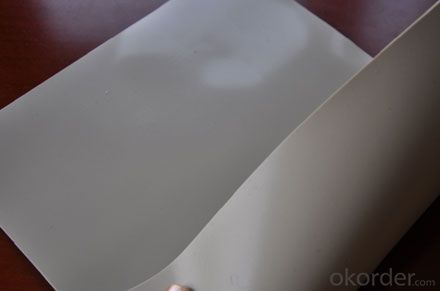
- Q: Is a waterproofing membrane resistant to gasoline or other petroleum-based substances?
- Yes, a waterproofing membrane is generally resistant to gasoline and other petroleum-based substances.
- Q: Can a waterproofing membrane be used on concrete walls?
- Concrete walls can benefit from the use of a waterproofing membrane. These membranes are specifically designed to prevent water from penetrating the surface and can be applied to various surfaces, including concrete walls. Common materials used for these membranes include modified bitumen, rubberized asphalt, and synthetic polymers, all of which are highly resistant to water and moisture. By applying a waterproofing membrane to concrete walls, one can effectively prevent water seepage, dampness, and potential damage caused by water infiltration. The membrane acts as a protective barrier, stopping water from permeating through the concrete and reaching the interior spaces. Additionally, it helps maintain the structural integrity of the concrete by reducing the risks of cracks, efflorescence, and other forms of moisture-related deterioration. There are several types of waterproofing membranes available in the market, such as sheet membranes, liquid membranes, and cementitious coatings. The choice of the membrane depends on factors such as the specific application, the degree of water exposure, and the condition of the concrete wall. It is essential to select a membrane that is compatible with the concrete and provides long-lasting waterproofing protection. Before applying the membrane, it is crucial to properly prepare the concrete surface. This involves tasks such as cleaning, repairing any cracks or imperfections, and ensuring that the surface is dry and free from contaminants. The membrane is then installed according to the manufacturer's instructions, which usually involves adhering it to the concrete or applying a liquid membrane with a brush or roller. To sum up, a waterproofing membrane is a valuable solution for protecting concrete walls from water infiltration. By choosing the right type of membrane and following proper installation procedures, one can effectively preserve the durability and longevity of the concrete while safeguarding the interior spaces from potential water damage.
- Q: Can a waterproofing membrane be used on precast nickel surfaces?
- Yes, a waterproofing membrane can be used on precast nickel surfaces. The membrane will provide a protective barrier against water penetration, helping to prevent moisture damage and corrosion on the nickel surface.
- Q: Is a waterproofing membrane resistant to solvents or chemical spills?
- Yes, a waterproofing membrane is typically resistant to solvents or chemical spills.
- Q: Can a waterproofing membrane be used for elevator pits and sump pits?
- Elevator pits and sump pits, commonly prone to water leakage and moisture problems, can benefit from the use of a waterproofing membrane. These membranes are designed to resist water penetration and create a barrier against water intrusion, effectively sealing the pits. Materials such as rubberized asphalt, EPDM, or PVC are typically used to construct these membranes, which are then applied to the walls and floors of the pits. The installation of a waterproofing membrane provides protection to the elevator and sump pits, safeguarding them against water damage, including corrosion, mold growth, and structural deterioration. This not only ensures the functionality and durability of the pits but also creates a safe and healthy environment for occupants and equipment. Nevertheless, it is essential to consider the specific requirements and regulations of elevator and sump pit installations, as different jurisdictions may have their own codes and standards that must be adhered to. Furthermore, proper installation and regular maintenance of the waterproofing membrane are crucial to guarantee its effectiveness in preventing water infiltration.
- Q: How does a waterproofing membrane handle water pressure from below?
- To prevent water from penetrating through, a waterproofing membrane is created to withstand water pressure from below. This membrane acts as a layer of protection, preventing water from seeping into the applied structure or area. Typically, the membrane is made from materials like rubber, PVC, or bitumen, which possess excellent water-resistant properties. These materials are flexible and can stretch to accommodate movement in the structure, ensuring the integrity of the membrane even in dynamic conditions. When faced with water pressure from below, the waterproofing membrane resists the force exerted by the water, effectively barring its entry into the structure. The membrane is installed to cover the entirety of the area requiring protection, creating a seamless and continuous barrier against water intrusion. Moreover, waterproofing membranes often possess additional features, such as reinforcement layers or fabric backings, to enhance their strength and durability. These features enable the membrane to withstand higher water pressures and reduce the risk of leaks or water damage. It is important to note that the effectiveness of a waterproofing membrane in handling water pressure from below depends on various factors, including the quality of the membrane, proper installation techniques, and the specific conditions of the site. Adequate surface preparation, correct membrane application, and regular maintenance are crucial to ensure the long-term performance of the waterproofing system. In summary, a waterproofing membrane is designed to create a robust barrier that can handle water pressure from below, safeguarding the structure or area from potential water damage.
- Q: Can a waterproofing membrane be used on concrete slabs or foundations?
- Concrete slabs or foundations can benefit from the application of a waterproofing membrane. These membranes are widely used in construction to safeguard structures against moisture damage and water infiltration. When a waterproofing membrane is applied to a concrete slab or foundation, it forms a protective barrier that prevents water from permeating the concrete and causing problems such as cracking, water damage, or mold growth. This specially designed membrane is capable of enduring hydrostatic pressure, which is the force exerted by still water, and it effectively ensures a dry environment. It is essential to choose a suitable waterproofing membrane that is compatible with the concrete and the specific project conditions. Adequate installation and maintenance of the membrane are also vital for long-lasting waterproofing effectiveness.
- Q: Roof SBS waterproofing membrane additional layer needs to be wide
- Asphalt waterproofing membrane is in the base tire (such as base paper, fibrous fabric) dip on asphalt, and then spread in the surface of powder or sheet of the isolation material made of curled sheet waterproof material.
- Q: Are waterproofing membranes suitable for crawl spaces?
- Yes, waterproofing membranes are suitable for crawl spaces. Crawl spaces are often prone to moisture and water intrusion due to their location and lack of ventilation. Waterproofing membranes provide an effective solution to prevent water damage and moisture-related problems in crawl spaces. These membranes are designed to create a barrier against water and moisture, preventing them from seeping into the crawl space and causing issues such as mold growth, rotting, and structural damage. Additionally, waterproofing membranes can also help to improve indoor air quality by reducing the levels of humidity in the crawl space. Overall, using waterproofing membranes in crawl spaces is highly recommended to ensure a dry, clean, and healthy environment.
- Q: Can waterproofing membranes be used on below-grade parking structures?
- Yes, waterproofing membranes can be used on below-grade parking structures. In fact, they are commonly used to protect these structures from water infiltration and potential damage. Waterproofing membranes are designed to provide a barrier against water penetration, thus preventing moisture from seeping into the concrete and causing deterioration. These membranes can be applied to the below-grade walls and floors of parking structures to ensure their long-term durability and structural integrity. Additionally, waterproofing membranes can also help prevent the formation of mold and mildew, which can be a common issue in damp environments such as below-grade parking structures. Overall, using waterproofing membranes is highly recommended for below-grade parking structures to protect them from water damage and extend their lifespan.
Send your message to us
PVC Roofing Garden Waterproofing Membrane
- Loading Port:
- China main port
- Payment Terms:
- TT OR LC
- Min Order Qty:
- 5000 m²
- Supply Capability:
- 100000 m²/month
OKorder Service Pledge
OKorder Financial Service
Similar products
Hot products
Hot Searches
Related keywords
